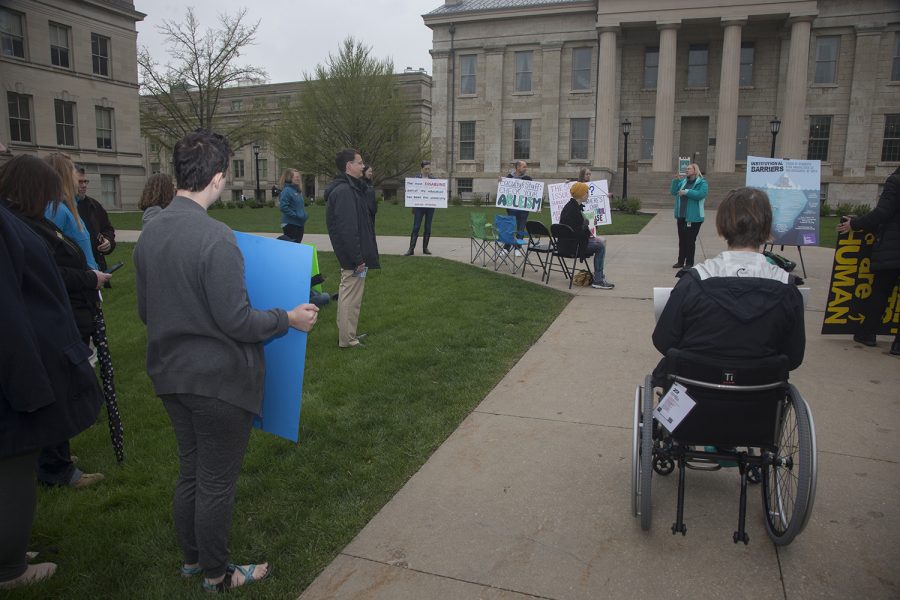Opinion | Disability Pride means recognizing that disability is not inability
Disability Pride Month is about recognizing the abilities of the people who have them, something that can improve societal attitudes and the lives of people with conditions.
Rally attendees hold signs and listen to speakers on the Pentacrest on Wednesday, May 1, 2019. UI Students for Disability Advocacy & Awareness organized this rally to speak about the injustice that students with disabilities face on campus.
July 28, 2020
Even when America is not in the middle of quarantine and protests against systemic racism, July’s celebration of disability pride is overlooked. As someone with a congenital heart defect and genetic disease, I see the value behind disability pride month.
Disability pride means realizing my worth as a person comes from what I can, instead of can’t, do. It means being eager, instead of uncomfortable, sharing my story publically. It means being thankful for and proud of all the abilities my disabilities have given me.
My disability to lift five pounds is my ability to see the humanity in people referred to as sociopaths and psychopaths. My disability to score a touchdown is my ability to notice someone’s eyes before his or her wheelchair. My disability to win a marathon is my ability to advocate for others with conditions.
Pride means proudly acknowledging that while a disability does not define a person, it does make up a part of who she or he is. The lessons mine have taught me make me the best version of myself.
They have taught me independence, positivity, and kindness. We all deserve acceptance, joy, and love. We’re more than enough just the way we are. Despite all our differences, we’re all people and capable of changing the world.
Pride means not seeing physical disability as weakness. My heart defect has strengthened, not weakened, my heart. It taught me to love others unconditionally. It gives me the ability to hear people on the opposing side of the political spectrum say I have a good heart.
I’m not proud of being the least athletic and physically healthy person in the room at least 80 percent of the time. I am proud of probably having more needles poked into me than everyone else in the room combined. Pride is realizing how much bravery people with disabilities have.
Disability pride means not seeing someone with one as inspirational just for doing normal everyday activities. Oftentimes, disabilities do not prevent that. People with them make more inspiring accomplishments than just getting out of bed. I want my writing to be inspiring, not that I can write despite my disabilities.
Disability pride means realizing having one does not prevent someone from accomplishing something praiseworthy. Helen Keller, Stephen Hawkings, and John Nash are good examples of that.
Disability pride is needed to improve the confidence, lives, and psychological well-being of people who have them. It can help people with disabilities feel valued, appreciated, and welcomed.
According to the Department of Labor, 153,000 workers with disabilities are legally paid less than the federal minimum wage. They have needed abilities in the workforce, making them worthy of being paid as much as other workers. Disability pride can help society realize this and make it illegal to pay workers with disabilities less.
Disability pride can save lives by making parents expecting babies with genetic diseases realize their kid will have abilities needed in this world, accomplish something prideworthy, and deserve a chance at life. It can save lives by encouraging people with mental illnesses to seek help.
A strong source of pride is people in your life who love and are proud of you. My pride comes from friends and family who support me. It comes from them treating and looking upon me as everyone else. It comes from them seeing the ability in my disabilities.
Pride comes from being proud of who you are as a person. I’m proud to understand heart conditions do not decrease the strength of hearts. I’m proud to understand genetics are not destiny.
Columns reflect the opinions of the authors and are not necessarily those of the Editorial Board, The Daily Iowan, or other organizations in which the author may be involved.



